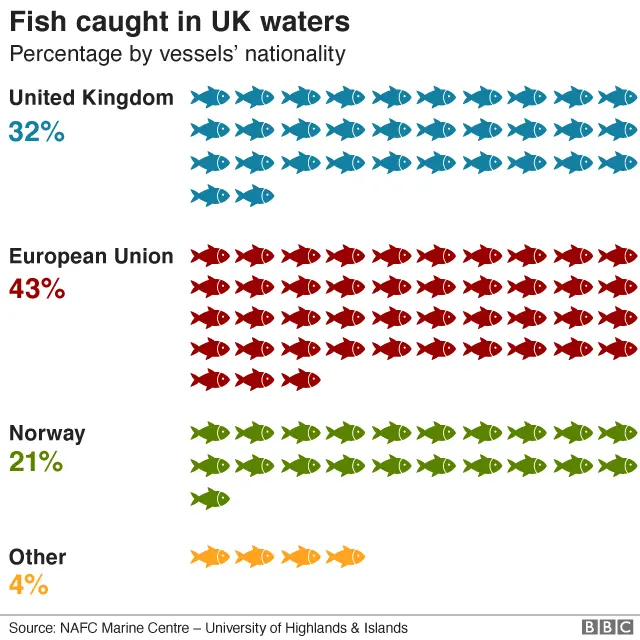Fishing will be a 'red line' in Brexit negotiations

The UK government will make getting a better deal for UK fishermen one of its five key negotiating principles with the EU.
It is the only industry to figure specifically in the list of negotiating priorities and is described as a "red line" issue.
The UK's hard line is expected to run into stiff opposition from EU fleets which account for over a third of the total catch in UK waters.
The UK has some of the richest fishing grounds in the world but British vessels catch less than a third of all fish caught there.
UK boats land 32%, EU boats 43% and Norwegian 21%.
In fact, the NAFC at the University of the Highlands and Islands estimates that EU fishing boats land almost eight times more fish and shellfish (by weight) in UK waters than UK boats land from EU waters.
At the end of this year the UK will become an independent coastal state with its own Exclusive Economic Zone (EEZ) and the final word on who can come in and who can't.

However, with fishing making up just 0.1% of the UK economy, fishermen have been fearful that their interests would be sacrificed to achieve greater EU market access for huge industries like finance - which is nearly 70 times more economically significant.
Boat skipper Andy Mcleod, who has fished out of Brixham for 35 years, summed up his hopes and fears.
"I voted to leave because I wanted more control over our waters and a better share of the [fish] quotas - my worry is that we will be used as pawns to be sacrificed for the greater good of the country."
'They will create mayhem'
Fishermen like Andy will be heartened by the government's hard line on fishing.
However, more UK fish for UK boats means less for others. Fish merchant Ian Perkes exports 95% of fish he buys in the UK - mainly to the EU. He does not expect EU countries - particularly France - to take a cut in their catch lying down.
"The French will make it very difficult for us if we take away their fishing. They will create mayhem - blockade ports, put on tariffs. Without that market we haven't got a business."
Symbolically and politically fishing punches way above its economic weight. It speaks to our identity as an island nation and is the life blood of coastal communities. Many fit the description of the "left behind" parts of Britain into which Boris Johnson has promised to inject new life.
Communities in France, Denmark and the Netherlands feel the same way about their own fishing fleets.
The political declaration signed by the UK and the EU recognised the importance of the industry and set a specific target of getting an agreement on fishing rights by July of this year.
A battle at sea, or at least over it, is coming soon.
